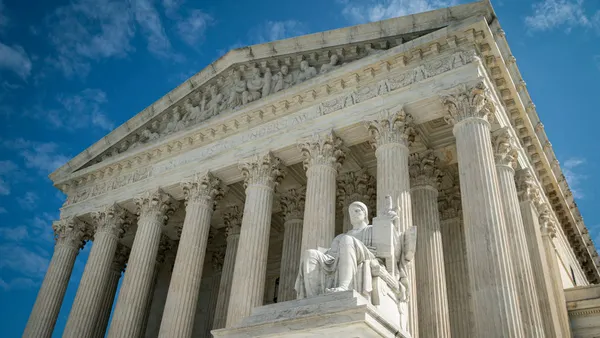Dive Brief:
- Allegedly ageist statements made by a Rite Aid district manager weren't severe enough for one of his former workplace subordinates to prevail on a claim of age discrimination, the 6th U.S. Circuit Court of Appeals ruled (Amini v. Rite Aid Corp., No. 19-2097 (6th Cir. July 7, 2020)).
- The late Michael Kheibari sued the nationwide drugstore chain for age and national origin discrimination and retaliation, in violation federal and state law. Kheibari, an assistant manager, said the new district manager several times told him he was "too old" and subjected him to slights such as entering the store and shaking everyone's hand except Kheibari's. Rite Aid eventually terminated Kheibari's employment.
- The district court ruled against Kheibari on summary judgment, and the 6th Circuit affirmed. The appeals court ruled that the conduct wasn't severe enough to support an age bias claim. Suggesting that the slights were "rude, perhaps," the court said the four or five age-based comments over nine months that Kheibari relied on to prove his case "hardly" constituted a hostile work environment. The court also noted that Kheibari's national origin claim failed because the conduct was not severe or pervasive enough that a reasonable person would find the conduct abusive or hostile.
Dive Insight:
The U.S. Equal Employment Opportunity Commission (EEOC), which enforces the Age Discrimination in Employment Act (ADEA), has said that while age-related harassment can include offensive or derogatory comments about a person's age, "simple teasing" or "offhand comments" generally are not enough for a finding of discrimination.
"Petty slights, annoyances, and isolated incidents (unless extremely serious) will not rise to the level of illegality," EEOC says in guidance. "To be unlawful, the conduct must create a work environment that would be intimidating, hostile, or offensive to reasonable people."
Courts have ruled in other lawsuits that what is described as "stray remarks" aren't enough to sustain claims of bias. For example, the 2nd Circuit concluded that despite age-related remarks from executives, two former employees of Adloox Inc. were fired for poor job performance, not age discrimination. Another court ruled that a few incidents over the span of multiple years were not enough to substantiate an employee's claims of hostile work environment, disparate treatment, retaliation and constructive discharge.
However, remarks, especially from managers, can provide evidence of discrimination. The 6th Circuit previously allowed a 58-year-old employee whose 52-year-old supervisor allegedly made multiple negative comments about her age to proceed with her age bias claim.
While the Amini court concluded that the alleged supervisor statements didn't support the discrimination claim, HR pros can still conduct training to prevent stereotyping and offensive comments, as well as adopt policies to address such remarks if they occur; after all, experts say managers remain a leading cause of bias claims.









